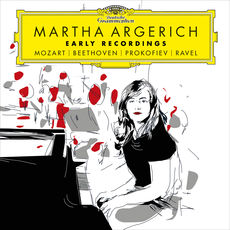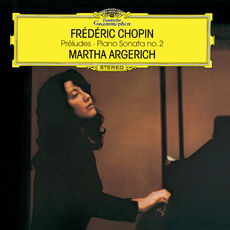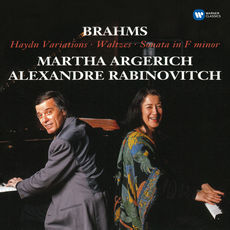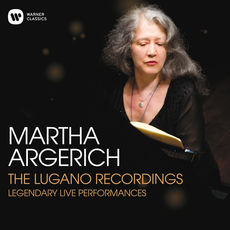It was at the Geneva Music Performance Competition in 1957, at the age of 16, that Martha Argerich first made a name for herself. She was supposed to face the judges in the early afternoon, though the rebellious teenager arrived late and casually told the judges “In my country it’s siesta time!”. You can imagine how that went down in the city known for its luxury watches and Swiss timing... Her performance of the first movement of Schumann’s Concerto in A minor in the competition’s final is just as moving today as it was to the judges back then, who awarded her a joint first prize together with the French pianist Dominique Merlet. Her playing was febrile and she combined a flawless technique with a touch of wild imagination, especially in the cadence, which she rendered both personal and visionary.
Three years later, Martha Argerich recorded her first album for Deutsche Grammophon (DG). The record was lauded by Vladimir Horowitz (1921-1989), who Argerich had wanted to meet but had never managed to do so. This debut album greatly boosted her worldwide reputation and a legend was born. She would always remain that same fiercely independent, passionate and mysterious woman that we find on the record. Though it wasn’t just her performances that became well-known, but her love affairs too. Three marriages gave her three daughters: Geneva-born violinist Lyda Chen, a daughter from her first brief marriage in New York to the Sino-American choir director Chen Liang-Sheng. Annie Dutoit is a teacher, journalist and actress who has managed to carve her own path away from her world-renowned mother and her equally famous father-cum-conductor, Charles Dutoit. Stéphanie Argerich is the result of her mother’s marriage to the American pianist Stephen Kovacevich, perhaps the greatest love of her life. Stéphanie is a filmmaker and in 2012 she directed Bloody Daughter, a deeply moving documentary about the complex and close relationship with her mother. The film reveals fragments of intimate conversations as well as some confessions uttered by the pianist who has difficulty communicating with words. She talks about her unconditional and inexplicable love for Schumann, her anguish of growing old and her fear of self-parody. She also admits that doesn’t like to talk about music, an exercise that she thinks “is completely useless”.
Anxious, dissatisfied and depressed, Martha Argerich turned to the piano. She never grew tired of playing the works that she had performed since childhood, always bringing a freshness to her repertoire.
A fast rise to fame
Everything moved fast for Martha Argerich and her tempos certainly didn’t suggest otherwise. As a child prodigy, she was not even three years old when her hands were first laid on a keyboard. It was her mother who made her take lessons with an Italian teacher based in Buenos Aires: the famous Vincenzo Scaramuzza, who sensed the little girl’s extraordinary talents very early on. Martha was 8 years old when she played Beethoven's First Concerto, which remains one of her favourite works to this day. She also played Mozart's Concerto No. 20 in D minor, which was only recorded on an album in 2013 during a final stirring encounter with Claudio Abbado, her long-time friend and musical partner. In 1955, her family emigrated to Europe and, thanks to a state scholarship granted by Juan Perón, the teenager studied with many great European masters, such as Friedrich Gulda, Stefan Askenaze, Nikita Magaloff, Madeleine Lipatti and Arturo Benedetti Michelangeli. Two years later she won competitions in quick succession at Geneva and Bolzano. Then everything started to fall apart. She moved to New York, stopped playing the piano for several years, thought about becoming a doctor and fell into a long depression. Her mother deprived her of custody to her first child and life seemed dull and pointless.
Back on track in 1965, she won the Warsaw Chopin Competition and received a standing ovation from the assembly for her brilliant performances of studies and mazurkas. She resurfaced and recorded her first album for DG and gave a recital at the Lincoln Center in New York.
Fiercely independent and unwilling to ever sign a contract, Argerich has never hesitated to cancel concerts or recordings to the great despair of her agents and organizers. She has taken both short and long breaks from the stage and between 1973 and 1976 she stopped all musical activity. Due to the lonely nature of solo playing, she gradually gave up solo recital to only play concertos or perform with carefully selected chamber music partners such as the pianists Stephen Kovacevich, Nelson Freire, Alexandre Rabinovitch or Nelson Goerner, and soloists such as Gidon Kremer, Mischa Maisky et aujourd’hui les frères Renaud et Gautier Capuçon.
An atypical repertoire
Despite performing fewer pieces from her extensive repertoire in recent years, Martha Argerich has recorded a huge number of works in a totally atypical configuration. She has recorded no complete sonatas or concertos; she plays only what she likes, when she likes. Worshipped by conductors and musicians alike, she performs all over the world with undeniable success, becoming one of the latest piano legends and undoubtedly one of the greatest performers of all time. Rather than adopting the role of capricious starlet, Martha Argerich is somewhat shy and tends to think that too much is being done for her. She avoids journalists and flashing cameras. After serious health issues, she has played for cancer foundations several times in recognition of the successful care she received at the John Wayne Cancer Institute in Santa Monica, California. A distant but much-loved mother, she is nevertheless close to her three daughters who view her as a kind of supernatural being who is remote and difficult to understand.
In tune with the younger generation
Martha Argerich has always supported young musicians and has never hesitated to use her own money to promote promising talents. One cannot forget the controversial stance she took at the 1980 Chopin Competition, where she slammed the jury’s door with a loud bang when Croatian pianist Ivo Pogorelich was eliminated in the second round, earning him the best publicity of his career. The Argentinian pianist also supported her young colleague Hélène Grimaud in her early days. Over the last decade, Martha Argerich has been heavily involved in the “Progetto Martha Argerich” in Lugano, a kind of perpetual laboratory with the concerts as the showcase for the results. Many young musicians gather under her leadership to prepare great chamber music together with a group of loyal musicians who attend every year to support the first steps of very young artists from all over the world.
This magnificent concept, which has culminated in years of concert recordings and publications, was terminated in 2016 following the withdrawal of its main sponsor, a Swiss-Italian bank. However, the pianist has many connections and since 2018 she has been invited to organise a new “Martha Argerich Festival” in Hamburg. Energetic as ever as she approaches her 80th birthday, she performed eleven concerts with her daughters as well as Khatia Buniatishvili, Maria João Pires, Renaud Capuçon, Edgar Moreau, Mischa Maisky and the Orchestre symphonique de Hambourg, conducted by Sylvain Cambreling.
It is probably her generous spirit and passion for music that keeps this incredible woman alive. Her artistic flair and dexterity has never wavered over the years. She is a true phenomenon and a shining example for budding young pianists.















